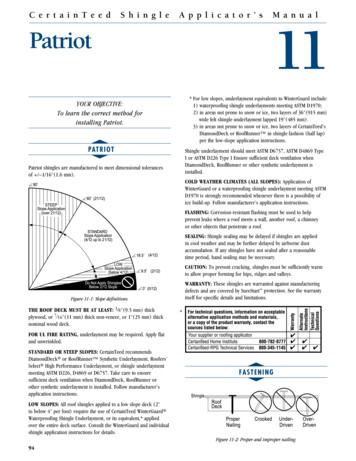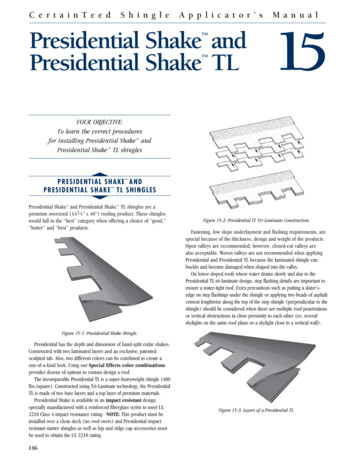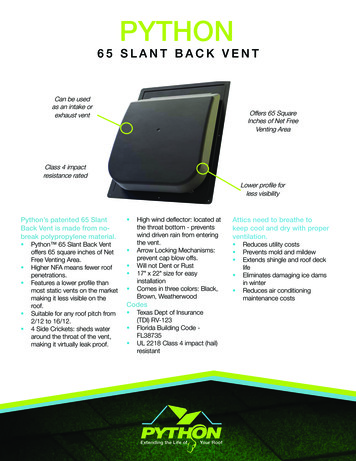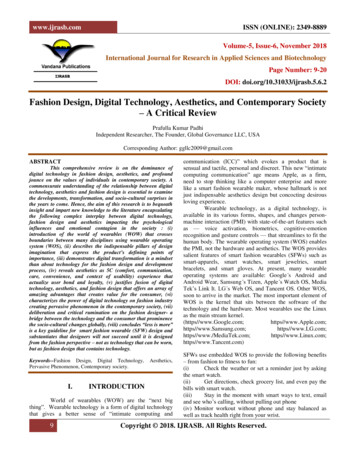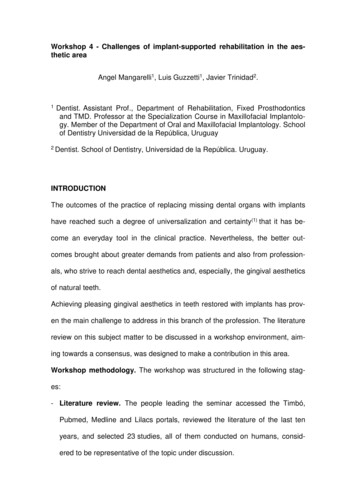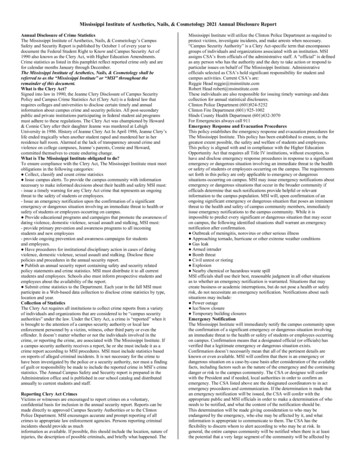
Transcription
Mississippi Institute of Aesthetics, Nails, & Cosmetology 2021 Annual Disclosure ReportAnnual Disclosure of Crime StatisticsThe Mississippi Institute of Aesthetics, Nails, & Cosmetology’s CampusSafety and Security Report is published by October 1 of every year todocument the Federal Student Right to Know and Campus Security Act of1990 also known as the Clery Act, with Higher Education Amendments.Crime statistics as listed in this pamphlet reflect reported crime only and arefor calendar months January through December.The Mississippi Institute of Aesthetics, Nails, & Cosmetology shall bereferred to as the “Mississippi Institute” or “MSI” throughout theremainder of this document.What is the Clery Act?Signed into law in 1990, the Jeanne Clery Disclosure of Campus SecurityPolicy and Campus Crime Statistics Act (Clery Act) is a federal law thatrequires colleges and universities to disclose certain timely and annualinformation about campus crime and security policies. All post-secondarypublic and private institutions participating in federal student aid programsmust adhere to these regulations. The Clery Act was championed by Howard& Connie Clery after their daughter Jeanne was murdered at LehighUniversity in 1986. History of Jeanne Clery Act In April 1986, Jeanne Clery’slife ended tragically when another student raped and murdered her in herresidence hall room. Alarmed at the lack of transparency around crime andviolence on college campuses, Jeanne’s parents, Connie and Howard,committed themselves to create enduring change.What is The Mississippi Institute obligated to do?To ensure compliance with the Clery Act, The Mississippi Institute must meetobligations in the following categories: Collect, classify and count crime statistics Issue campus alerts. To provide the campus community with informationnecessary to make informed decisions about their health and safety MSI must:- issue a timely warning for any Clery Act crime that represents an ongoingthreat to the safety of students or employees.- Issue an emergency notification upon the confirmation of a significantemergency or dangerous situation involving an immediate threat to health orsafety of students or employees occurring on campus. Provide educational programs and campaigns that promote the awareness ofdating violence, domestic violence, sexual assault and stalking, MSI must:- provide primary prevention and awareness programs to all incomingstudents and new employees- provide ongoing prevention and awareness campaigns for studentsand employees. Have procedures for institutional disciplinary action in cases of datingviolence, domestic violence, sexual assault and stalking. Disclose thesepolicies and procedures in the annual security report. Publish an annual security report containing safety and security relatedpolicy statements and crime statistics. MSI must distribute it to all currentstudents and employees. Schools also must inform prospective students andemployees about the availability of the report. Submit crime statistics to the Department. Each year in the fall MSI mustparticipate in a Web-based data collection to disclose crime statistics by type,location and year.Collection of StatisticsThe Clery Act requires all institutions to collect crime reports from a varietyof individuals and organizations that are considered to be “campus securityauthorities” under the law. Under the Clery Act, a crime is “reported” when itis brought to the attention of a campus security authority or local lawenforcement personnel by a victim, witness, other third party or even theoffender. It doesn’t matter whether or not the individuals involved in thecrime, or reporting the crime, are associated with The Mississippi Institute. Ifa campus security authority receives a report, he or she must include it as acrime report according to MSI procedures. MSI must include statistics basedon reports of alleged criminal incidents. It is not necessary for the crime tohave been investigated by the police or a security authority, nor must a findingof guilt or responsibility be made to include the reported crime in MSI’s crimestatistics. The Annual Campus Safety and Security report is prepared in theAdministration office and is published in our school catalog and distributedannually to current students and staff.Reporting Clery Act CrimesVictims or witnesses are encouraged to report crimes on a voluntary,confidential basis for inclusion in the annual security report. Reports can bemade directly to approved Campus Security Authorities or to the ClintonPolice Department. MSI encourages accurate and prompt reporting of allcrimes to appropriate law enforcement agencies. Persons reporting criminalincidents should provide as muchinformation as available. If possible, this should include the location, nature ofinjuries, the description of possible criminals, and briefly what happened. TheMississippi Institute will utilize the Clinton Police Department as required toprotect victims, investigate incidents, and make arrests when necessary.“Campus Security Authority” is a Clery Act-specific term that encompassesgroups of individuals and organizations associated with an institution. MSIassigns CSA’s from officials of the administrative staff. A “official” is definedas any person who has the authority and the duty to take action or respond toparticular issues on behalf of The Mississippi Institute. Administrativeofficials selected as CSA’s hold significant responsibility for student andcampus activities. Current CSA’s are:Reggie Head reggie@msinstitute.comRobert Head robert@msinstitute.comThese individuals are also responsible for issuing timely warnings and datacollection for annual statistical disclosures.Clinton Police Department (601)924-5252Clinton Fire Department (601) 925-1002Hinds County Health Department (601)432-3070For Emergencies always call 911Emergency Response and Evacuation ProceduresThis policy establishes the emergency response and evacuation procedures forThe Mississippi Institute. This policy has been established to ensure, to thegreatest extent possible, the safety and welfare of students and employees.This policy is aligned with and in compliance with the Higher EducationOpportunity Act that requires all Title IV institutions, without exception, tohave and disclose emergency response procedures in response to a significantemergency or dangerous situation involving an immediate threat to the healthor safety of students or employees occurring on the campus. The requirementsset forth in this policy are only applicable to emergency or dangeroussituations occurring on campus. MSI may issue emergency notifications aboutemergency or dangerous situations that occur in the broader community ifofficials determine that such notifications provide helpful or relevantinformation to the campus population. MSI will, upon confirmation of anongoing significant emergency or dangerous situation that poses an imminentthreat to the health and safety of campus community members, immediatelyissue emergency notifications to the campus community. While it isimpossible to predict every significant or dangerous situation that may occuron campus, the following identified situations shall warrant an emergencynotification after confirmation. Outbreak of meningitis, norovirus or other serious illness Approaching tornado, hurricane or other extreme weather conditions Gas leak Armed intruder Bomb threat Civil unrest or rioting Explosion Nearby chemical or hazardous waste spillMSI officials shall use their best, reasonable judgment in all other situationsas to whether an emergency notification is warranted. Situations that maycreate business or academic interruptions, but do not pose a health or safetyrisk, do not necessitate an emergency notification. Notifications about suchsituations may include: Power outage Ice/Snow closure Temporary building closuresEmergency NotificationThe Mississippi Institute will immediately notify the campus community uponthe confirmation of a significant emergency or dangerous situation involvingan immediate threat to the health or safety of students or employees occurringon campus. Confirmation means that a designated official (or officials) hasverified that a legitimate emergency or dangerous situation exists.Confirmation doesn’t necessarily mean that all of the pertinent details areknown or even available. MSI will confirm that there is an emergency ordangerous situation on a case-by-case basis after consideration of the availablefacts, including factors such as the nature of the emergency and the continuingdanger or risk to the campus community. The CSA or designee will conferwith the President and if needed, local authorities in order to confirm anemergency. The CSA listed above are the designated coordinators to in actemergency procedures and communication. If the determination is made thatan emergency notification will be issued, the CSA will confer with theappropriate public and MSI officials in order to make a determination of whoneeds to be notified, and what the content of the notification should be.This determination will be made giving consideration to who may beendangered by the emergency, who else may be affected by it, and whatinformation is appropriate to communicate to them. The CSA has theflexibility to discern whom to alert according to who may be at risk. Ingeneral, the entire campus community will be notified when there is at leastthe potential that a very large segment of the community will be affected by
the situation, or when the situation threatens the operation of the campus as awhole. There will be continuing assessment of the situation and additionalnotifications may be issued if a situation warrants such action. The CSA willdetermine how much information is appropriate to disseminate at differentpoints in time. Depending on what segments of the community notificationstarget, the content may differ.Initiating the Notification SystemThe Mississippi Institute will, without delay, and taking into account thesafety of the community, determine the content of the notification and initiatethe notification system, unless issuing a notification will, in the professionaljudgment of responsible authorities, compromise efforts to resolve theemergency. As soon as MSI has confirmed that a significant emergency ordangerous situation exists, CSAs shall: Take into account the safety of the campus community Determine what information to release about the situation Begin the notification process. The only reason a CSA would notimmediately issue a notification for a confirmed emergency or dangeroussituation would be if doing so would compromiseefforts to assist a victim, contain the emergency, respond to the emergency, orotherwise mitigate the emergency. MSI will notify the campus communitythat there’s an emergency or dangeroussituation as follows: Notify first applicable local first responders Prompt campus alarms and public-address system Text message system Email notification; to include more specific information as it comesavailable CSAs listed above are responsible for Containing the emergency,Coordination of public responders, and initiating the emergency notificationsystem.Disseminating emergency information to the larger community.The Mississippi Institute disseminates emergency information to individualsand/or organizations outside of the campus community in the following ways: Cell phone alerts to students Use of radio and/or TV alerts for the neighboring community Social media pagesCSAs are responsible for developing the information to be disclosed and foroverseeing the dissemination of pertinent information to the largercommunity.Testing of the Emergency Response and Evacuation ProceduresMSI tests the emergency response and evacuation procedures on at least anannual basis. Testing includes: Tests that may be announced or unannounced. Tests are regularly scheduleddrills, include exercises and appropriate follow-through activities, designedfor assessment and evaluation of MSI’s emergency plans and capabilities. Tests are conducted, at minimum, at least once a year and may beannounced or not.To comply with the Clery Act requirement the test must meet all of the criteriabelow: It must be scheduled. An actual emergency situation or a false emergencyalarm served may not serve as a test. Must contain drills. A drill is an activity that tests a single proceduraloperation (e.g., a test of initiating a cell phone alert system or a test of campussecurity personnel conducting a campus lockdown). Must contain exercises. An exercise is a test involving coordination ofefforts (e.g.,a test of the coordination of first responders, including police,firefighters and emergency medical technicians). Must contain follow-through activities. A follow-through activity is anactivity designed to review the test (e.g., a survey or interview to obtainfeedback from participants). Must be designed for assessment of emergency plans and capabilities. Thetest should have measurable goals.Crimes Exempt From the Timely Warning RequirementThe Mississippi Institute is not required to provide a timely warning for nonClery Act crimes or for crimes reported to a pastoral or professionalcounselor. There are no other exemptions. MSI does not employee or haveaffiliation with Pastoral or Professional counselors.Evacuation ProceduresAn evacuation of part or all of campus may be required before, during, or aftera significant incident, emergency, disaster or major disaster, or catastrophicincident. An evacuation may constitute the movement of people from one areaof the campus to another, or it could require movement to an off-campuslocation away from the hazards affecting an evacuation requirement. Such anevacuation may lead to an eventual return to the campus, or may involvereunification and/or mass transportation efforts in the event the return ofpeople to the campus is not feasible. The primary goal is a safe and orderlyevacuation to save lives and allow responding emergency personnelunimpeded access to address the campus incident. Identify specific areas of the campus to be evacuated, and where thedisplaced people are to be sheltered (and by what method if beyond walkingdistance). Specify transportation pickup location(s) for mobility impaired persons. The authority to issue a campus evacuation order rests with the CSAs ortheir designee; the authority to issue an order covering the area surroundingand/or including the campus rests with the City according to its ordinancesand plans. Alert local officials of evacuation plan. The evacuation order should not be lifted until consultation is made betweenthe campus and city officials. The authority to lift a campus evacuation orderrests with the CSA or their designee; the authority to lift an order covering thearea surrounding and/or including the campus, issued by the city, rests withthe city according to its ordinances and plans.Security and Access to Campus FacilitiesEmployees or students seeking access to campus, outside establishedoperational hours, must have prior permission from an administrator.Security of the campus facility is top priority in maintaining a safe campus.For this purpose only administrators are given keys to gain access into thebuilding and are responsible for the locking/unlocking of building entriesdaily. The CSAs listed above are responsible for overseeing the physicalsafety of the facility. They work in tandem with property management toensure pathways and entrances are well lit and that entry locks are in workingorder. There is no on-campus housing.Campus and Security EducationInformation about emergency response procedures is provided at thebeginning of enrollment at student orientation, and it is re-emphasizedthroughout the year on a campus-wide basis as other relevant advisories areissued. Information on how to receive emergency notifications is also locatedin security report which is printed in the school catalog and distributedannually to all students and staff. A common theme of procedures is toencourage students and employees to be aware of their responsibility for theirown security and the security of others.The Mississippi Institute e does not have a crime prevention program.Campus Law EnforcementThe Mississippi Institute does not employee campus law enforcement orsecurity personnel.Student Organizations with Non-Campus LocationsMSI does not have any officially recognized student organizations with noncampus locations.Alcohol Policies and GuidelinesThe Mississippi Institute is committed to excellence in all aspects of personaland academic life. Alcohol abuse and misuse is a significant impediment toachieving this excellence. Therefore, MSI permits only responsible, legalconsumption of alcohol and complies with all federal, state and local lawsconcerning alcohol and illegal drugs.Alcohol policies apply to the campus and to all sponsored activities at offcampus locations. Administrators, alumni, faculty, guests, staff, and studentsmust adhere to all applicable state and local laws and MSI regulations relatedto the sale, possession, and use of alcoholic beverages. The most commonlaws and regulations related to alcohol use and sales are as follows:1. Alcohol is not permitted on campus2. The sale of alcoholic beverages is prohibited except in designated areas attimes and dates licensed by the Mississippi Department of Revenue.3. In the State of Mississippi, it is against the law for persons under 21 yearsof age to possess or consume alcoholic beverages. MSI enforces all federal,state, and local laws concerning possession and/or consumption of alcohol.Enforcement options may include criminal charges as well as a referral to theadministration for possible disciplinary sanctions.4. The furnishing of alcoholic beverages to underage persons is also againststate law.5. Alcohol cannot be consumed or carried in open containers on any street,sidewalk, alley, automobile, or public area.6. No person under legal drinking age or any obviously intoxicated personshall be furnished, served, or given an alcohol beverage.Illegal DrugsFederal and State drug laws as well as MSI policy prohibit the sale, unlawfulmanufacture, distribution, dispensation, possession, or use of a controlledsubstance, or of illicit drugs, on university property or as part of any MSIactivity, in compliance with the 2013 Campus Security Report 29 Drug FreeSchools and Communities Act andthe Drug-Free Workplace Act. MSI enforces all federal, state, and local druglaws. This prohibition applies to all students and to all employees.Drug and Alcohol Abuse Education ProgramsMSI provides education, counseling, and referral for rehabilitative treatmentrelating to drug and alcohol abuse. Program information is available throughthe administrative office.Dating Violence, Domestic Violence Sexual Assault and Stalking
MSI prohibits dating violence, domestic violence, sexual assault and stalking,as they are defined for purposes of the Clery Act.Dating violence is defined as violence committed by a person who is or hasbeen in a social relationship of a romantic or intimate nature with the victim.The existence of such a relationship shall be determined based on thereporting party’s statement and with consideration of the length of therelationship, the type of relationship, and the frequencyof interaction between the persons involved in the relationship. For thepurposes of this definition dating violence includes, but is not limited to,sexual or physical abuse or the threat of such abuse. Dating violence does notinclude acts covered under the definitionof domestic violence.Domestic Violence is defined as: A felony or misdemeanor crime of violence committed by a current orformer spouse or intimate partner of the victim or by a person with whom thevictim shares a child in common. By a person who is cohabitating with, or has cohabitated with, the victim asa spouse or intimate partner. By a person similarly situated to a spouse of the victim under the domesticor family violence laws of the jurisdiction in which the crime of violenceoccurred By any other person against an adult or youth victim who is protected fromthat person’s acts under the domestic or family violence laws of thejurisdiction in which the crime of violence occurred.Stalking is defined as engaging in a course of conduct directed at a specificperson that would cause a reasonable person to: Fear for the person’s safety or the safety of others Suffer substantial emotional distress.Sexual Assault is defined as an offense that meets the definition of Rape,Fondling, Incest or Statutory Rape as used in the FBI’s UCR program andincluded in Appendix A of 34 CFR Part 668.The state of Mississippi defines consent as: (a) Whether or not specificallystated, it is an element of every offense defined in this article, with theexception of subdivision (a)(3) of Section 13A-6-65, that the sexual act wascommitted without consent of the victim. (b) Lack of consent results from: (1)Forcible compulsion; or (2) Incapacity to consent; or (3) If the offensecharged is sexual abuse, any circumstances, in addition to forcible compulsionor incapacity to consent, in which the victim does not expressly or impliedlyacquiesce in the actor's conduct. (c) A person is deemed incapable of consentif he is: (1) Less than 16 years old; or (2) Mentally defective; or (3) Mentallyincapacitated; or (4) Physically helpless.Education and ProgramsThe Mississippi Institute has the following programs in place to promoteawareness and to educate people about preventing dating violence, domesticviolence, sexual assault and stalking. MSI works with local organizations thatassist victims of dating violence, domestic violence, sexual assault andstalking, such as local rape crisis centers,local law enforcement officials, social services personnel, state coalitionsagainstdomestic and sexual violence, when developing these programs. Programs toprevent dating violence, domestic violence, sexual assault and stalking aredefined as comprehensive, intentional and integrated programming, initiatives,strategies and campaigns intended to end dating violence, domestic violence,sexual assault and stalking must be: Culturally relevant Inclusive of diverse communities and identities Sustainable Responsive to community needs Informed by research or assessed for value, effectiveness or outcome Consider environmental risk and protective factors as they occur on theindividual, relationship, institutional, community, and societal levels.Programs to prevent dating violence, domestic violence, sexual assault andstalking must include primary prevention and awareness programs. Primary prevention programs are defined as programming, initiatives andstrategies intended to stop dating violence, domestic violence, sexual assaultand stalking before they occur through the promotion of positive and healthybehaviors that foster healthy, mutually respectful relationships and sexuality,encourage safe bystander intervention, and seek to change behavior and socialnorms in healthy and safe directions. Awareness programs are defined as community wide or audience-specificprogramming, initiatives and strategies that increase audience knowledge, andshare information and resources to prevent violence, promote safety andreduce perpetration. Programs to prevent dating violence, domestic violence,sexual assault and stalking mustbe directed at all incoming students and new employees. The statute andregulations do not require that all students and employees take or attend thetraining, but MSI highly recommends training to increase its effectiveness.MSI provides all incoming students and new employees with activenotification of the training’s availability. MSI utilizes online interactivetraining which provides a format and timeframe that encourages and allowsfor maximum participation.Bystander InterventionEveryone has a role to play in preventing sexual assault. There are manydifferent ways that you can step in or make a difference if you see someone atrisk. This approach to preventing sexual assault is referred to as “bystanderintervention.” Bystander Intervention is a philosophy and strategy forprevention of various types of violence, including bullying, sexualharassment, sexual assault, and intimate partner violence. The key to keepingyour friends safe is learning how to intervene in a way that fits the situationand your comfort level. Having this knowledge on hand can give you theconfidence to step in when something isn’t right. Stepping in can make all thedifference, but it should never put your own safety at risk. Some examples ofways to play a role in preventing sexual assault may be:A. creating a distraction. Do what you can to interrupt the situation. Adistraction can give the person at risk a chance to get to a safe place.B. Talk directly to the person who might be in trouble.C. Refer to an authority. Sometimes the safest way to intervene is to refer to aneutral party with the authority to change the situation, like and administratoror teacher or calling 911.Risk ReductionRisk reduction strategies may be helpful in some situations, however cannotprevent all assaults. Listed below are some tips for reducing the risk ofbecoming a victim. Trust your instincts. Listen to your inner voice and act on it Ask yourself, “Am I able to say ‘no’?” and “Am I comfortable with what ishappening?” Communicate clearly if you don’t like what someone is doing - don’t beafraid to make waves Take care of yourself on a date: Be prepared to pay your own way, haveaccess to a phone, arrange for transportation Get out of the situation as soon as you sense danger or feel afraid Learn about your ability to protect and defend yourself. Take assertivenesstraining and self-defense coursesProcedures Victims Should Follow in the Case of Alleged DatingViolence, Domestic Violence, Sexual Assault or StalkingIt is important for an individual who has experienced sexual misconduct to getto a safe space and seek support. In addition to getting to a safe space, theuniversity encourages individuals to preserve all evidence to assist theindividual with their options of reporting. The following are tips forpreserving evidence: Do not alter, dispose of or destroy any physical evidence. If there is suspicion that a drink may have been drugged, inform a medicalassistance provider and/or law enforcement as soon as possible so they canattempt to collect potential evidence (e.g., from the drink, through urine orblood sample). Preserve evidence of electronic communications by saving them and/or bytaking screenshots of text messages, instant messages, social networkingpages or other electronic communications, and by keeping pictures, logs orcopies of documents that relate to the incident and/or respondent. Even if complainants choose not to make a complaint regarding sexualmisconduct, they should nevertheless consider speaking with a staff memberor other law enforcement to preserve evidence in the event that they changetheir mind at a later date. Do not change out of the clothing you were wearing at the time of yourassault. If you must change, place your old clothes in a paper bag and do notwash it. Pack a change of clothes to bring to local police department or local hospital. Do not shower, bathe, brush teeth, eat, drink or change bedding before goingto the hospital or seeking medical attention.ReportingComplaints should be submitted in writing to an uninvolved member of thestaff. The Mississippi Institute will attempt to keep complaints private to theextent possible and consistent with legal requirements and requirements toinvestigate allegations and take appropriate action. Available options forresolving the complaint through the informal process or formal processdepending on the nature of the complaint. Students, faculty, staff, and visitorsare encouraged to report criminal offenses to the local police department inaddition to reporting them to designated Institution officials. The Institutionwill assist students in notifying local law enforcement if requested. The localpolice department, local county sheriff's department, and other local policeagencies, state agencies, and federal law enforcement agencies have criminaljurisdiction on this campus. After reporting a sexual assault, a student oremployee victim may request changes in their academic situation. Theseaccommodations may be made if requested and if they are reasonablyavailable. When a student reports VAWA crime, the institution will provide awritten explanation of the student’s rights and options. The Mississippi
Institute will maintain publicly available recordkeeping with the inclusion ofpersonally identifying information about the victim. Counseling for victims ofsexual assault is not available on campus. Upon request, the MississippiInstitute will provide written notification to victims about options availableoff-campus assistance.Orders of ProtectionThe Mississippi Institute does not issue orders of protection, however; victimscan protect themselves by filing a Request for a Protective Order with thecourt. MSI will comply with and enforce orders associated with the ProtectiveOrder. MSI is obligated to comply with a student’s reasonable request for anacademic situation change following an alleged sex offense. The student maymeet withthe President to determine the best individual plan to ensure the student’ssafety and academic success. Factors that might be considered in developingthe personal plan may include, but are not limited to the following: The specific need expressed by the complainant The age of the students involved The severity or pervasiveness of the allegations Any continuing effects on the complainant; whether the complainant andalleged perpetrator share the same classes or attendance schedule Whether other judicial measure
The Mississippi Institute of Aesthetics, Nails, & Cosmetology shall be referred to as the "Mississippi Institute" or "MSI" throughout the remainder of this document. What is the Clery Act? Signed into law in 1990, the Jeanne Clery Disclosure of Campus Security Policy and Campus Crime Statistics Act (Clery Act) is a federal law that
